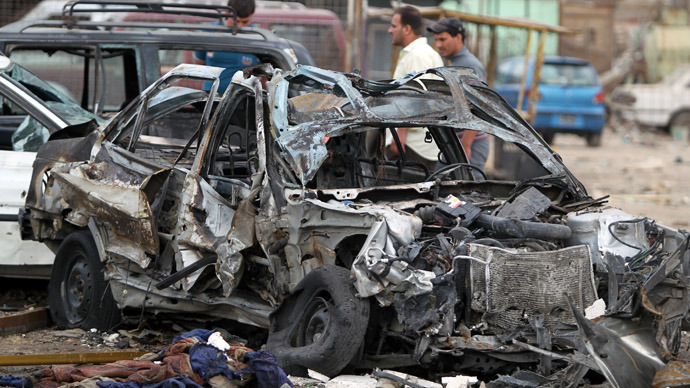Iraq violence 'a war between people and the government'

Bloodshed in Iraq shows no signs of ending but the situation would get even worse unless the government starts to work actively to calm the protests down, experts on the issue Shwan Zulal and Dirk Adriaensens told RT.
Over 200 people have been killed in a week of sectarian violence in Iraq. It started out with a deadly firefight in the north, where the military raided a Sunni anti-government protest camp. More than 50 civilians died in the attack last Tuesday.
Baghdad has blocked 10
television channels operating in the region, including Al Jazeera,
accusing them of promoting violence. With no sign of peace between
the Sunni and the ruling Shia communities, Iraq's Prime Minister
warns the state is dragging itself into a civil
war.
“The situation in Iraq is dire at the moment and it has been since the American Army left the country,” says political analyst and blogger Shwan Zulal.
“Even when they were in Iraq it wasn’t perfect. Violence was there even before. But since the US Army left Iraq the current Prime Minister Nouri al-Maliki turned more authoritarian and marginalized the other factions – the Sunnis in particular and obviously the Kurds, given all the problems with the Kurds over the oil sharing and constitutional interpretations. So the problem has now moved to a different phase where the Sunni majority has been protesting for the last few months. They’ve been making some legitimate and reasonable demands, but the government has ignored these demands.”
History is now repeating itself Zulal says: “Everyone knows what Saddam Hussein did and what were the problems then, but since 2003 the political process in Iraq hasn’t been working. We have the three major factions in Iraq – we have the Kurds, and then we have the sectarian divide between the Sunnis and the Shias. The Sunnis have always been in charge but when in 2003 the Shias took control they in some way tried to marginalize the Sunnis and control them by force. It didn’t work with the Sunnis. We all know what happened in 2003, and now the same thing is happening.”

The Iraqi politicians “need to realize that the only way to find a solution and bridge this violence is to sit round the table. But sadly, the Iraqi politicians have proved to be very unreliable. They just can’t agree on anything that is taking the political process forward. So I can’t see how this impasse will be resolved. I’m pessimistic about the outcome of the next few days and the violence is likely to get even worse, because there are various groups who are not willing to do peaceful demonstrations anymore. They declared war on the government,” Zulal says.
SOS Iraq coordinator Dirk Adriaensens echoes the London-based expert. “I think the situation in Iraq will go from bad to worse and it’s only the fault of Mr al-Maliki,” he says before adding: “The government should be held to account. After ten years of occupation there are still no basic services. People are randomly arrested, locked up without charge, tortured, women, children and men are being raped. The talk about sectarianism is wrong. These are not sectarian protests. These are protests against the unbearable situation for the Iraqi people. There is poverty, there is unemployment, there is no healthcare, the education system has collapsed.”
“I think it’s a war between the people of Iraq and the government. There were elections last week, but one third of the provinces couldn’t vote because of the so-called security reasons. How can this vote be legitimate? Al-Maliki is always talking about unity but he is the one, who forces people into sectarian activities. Iraqi people say it’s not the protesters who go into the streets and plant bombs. The people of Iraq suspect that the government itself and the militias that are linked to the political parties are planting the bombs themselves. I don’t know whether it’s true or false, but I tend to believe it,” Adriaensens argues.
The statements, views and opinions expressed in this column are solely those of the author and do not necessarily represent those of RT.












